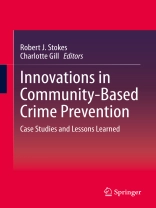This book explores multi-year community-based crime prevention initiatives in the United States, from their design and implementation, through 5-year follow ups. It provides an overview of programs of various sizes, affecting diverse communities from urban to rural environments, larger and smaller populations, with a range of site-specific problems. The research is based on a United States federally-funded program called the Byrne Criminal Justice Initiative (BJCI) which began in 2012, and has funded programs in 65 communities, across 28 states and 61 cities.
This book serves to document the process, challenges, and lessons learned from the design and implementation of this innovative program. It covers researcher-practitioner partnerships, crime prevention planning processes, programming implementation, and issues related to sustainability of community-policing initiatives that transcend institutional barriers and leadership turnover. Through researcher partnerships at each site, it provides a rich dataset for understanding and comparing the social and economic problems that contribute to criminality, as well as the conditions where prosocial behavior and collective efficacy thrive. It also examines the future of this federally-funded program going forward in a new Presidential administration.
This work will be of interest to researchers in criminology and criminal justice, particularly with an interest in translational/applied criminology and crime prevention, as well as related fields such as public policy, urban planning, and sociology.
สารบัญ
Crime, Place and Community Contexts: An Introduction to the Byrne Criminal Justice Innovation Program.- Think Nationally, Act Locally: An Overview of BJCI Communities and the Challenges of Community Capacity Deficits.- Case Studies from 6 Neighborhoods.- Five Years In: The Current Impacts of BJCI.- The Death and Life of Community-Based Crime Prevention Partnerships and the Future Role of the Federal Government.
เกี่ยวกับผู้แต่ง
Robert Stokes is an Associate Professor and Chair of the Public Policy program within the School of Public Service at De Paul University. His research has focused on public safety and security planning, specifically police-community relations and community-led safety planning; economic revitalization planning and place management strategies for urban retail areas; environmental sustainability planning; and healthy places planning. He has been published in various academic journals and is the co-author of a recent book, Changing Places: The Science and Art of New Urban Planning. A native of Philadelphia, he holds a Ph.D. from the Bloustein School of Planning and Public Policy at Rutgers University.
Charlotte Gill is Associate Professor and Deputy Director of the Center for Evidence-Based Crime Policy in the Department of Criminology, Law and Society, George Mason University. Her primary research interests are community- and place-based crime prevention approaches, particularly with juveniles and youth; community policing; program evaluation; and research synthesis. Dr. Gill has fifteen years of experience in applied experimental and quasi-experimental research and is currently partnering with police departments and community groups around the United States to develop and test community-led approaches to place-based prevention and improve police responses to people with mental health issues. Dr. Gill is also a member of the Campbell Collaboration Crime and Justice Group and a Fellow of the Academy of Experimental Criminology. She is the recipient of a number of awards and honors, including the Andrew Carnegie Fellowship (2017-19) and the 2019 Outstanding Faculty – Rising Star award from the State Council for Higher Education of Virginia.












